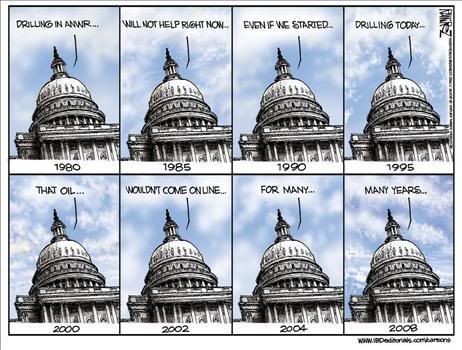How right you are!

Posted on 05/23/2008 8:39:48 PM PDT by oldscouter
At the time of the 1972 OPEC oil embargo, the domestic production of crude oil in America peaked at about 10 million barrels per day. This domestic production accounted for almost 2/3’s of our total needs, resulting in about 1/3 of our needed crude to be imported. The chilling effect of the embargo on our economy, and ability to provide for the national defense, resulted in our political leadership pledging that the government would work to allow America to achieve energy independence in 10 years. What have we achieved so far?
(Excerpt) Read more at oldscout.blogtownhall.com ...
bookmark
later
shale development is a little problematic. If you mine it, you’re talking about strip mining most of western Colorado, and there’s the question with what to do with all the waste rock. Then there’s the question of where to get the water for processing, in what is essentially a desert. There are some new methods for extracting the oil in place, but they’re still in the testing stage.
What killed shale development was not the government, but the eighties oil crash. After sinking so much money into shale, only to have it become economically unfeasible overnight, the oil companies have been reluctant to invest in it again.
The big difference between now and the ‘70s is that there is no shortage of oil or gasoline. Yes, prices are historically hight, but there’s no rationing, or gas shortages, or odd/even days to get gas. Keep the government out, and the free market will work.
Keep the government out, and the free market will work.
I've said it before and I'll say it again, the invocation of the Manhattan Project and the Apollo Program as prototypes for some kind of miraculous effort at extracation from this predicament are unfounded.
These programs represented profilgate EXPENDITURES of energy and resources for the achievement of focused goals. They were the very epitome of the "expense be damned" philosophy, and are "180 degrees out of phase" with the realities of the situation we are now faced with.
How right you are!

***What have we achieved so far?***
Bupkis
It’s absolutely maddening
Meant to sdd this from Shell Oil page,
“On only a 30 x 40 foot testing area, Shell successfully recovered 1,700 barrels of high quality light oil plus associated gas from shallower, less-concentrated oil shale layers. Our research to date has demonstrated that our In situ Conversion Process (ICP) works technically on a small scale - what remains is to prove it can work commercially.”
RIGHT ON! Couldn’t be better stated.
This is a very good article. Worth bookmarking. But ineptness is an entirely inadequate and unbelievable explanation. The article reads like a trail of circumstantial evidence and the evidence points to deliberate sabotage. To believe that these things occurred without intent, that Senators, Congressmen, bureaucrats and Presidents didn't have access to this kind of information or don't possess an ounce of common sense is beyond credibility. The rational conclusion here is all too obvious to me.
Yes, a big 1700 barrels. And that’s from their most recent test in 2005. And their extraction process is enormously complex.
These GREENIES are IDIOTS...NOTHING we do will satisfy them so why try?!!! Drill ANWR, build nuclear and screw them.
NEW YORK—U.S. environmental advocates are nervous that record crude oil prices will lead to a boom in production of fossil fuels like motor fuel from coal, Canada’s tar sands, or shale in Colorado that would emit more planet-warming gases than conventional oil.
“High oil prices are a double-edged sword,” said Deron Lovaas, an automobile expert at green group the Natural Resources Defense Council.
Rising crude prices were once a no-brainer for U.S. greens; the steeper the price, the more likely car-pooling and public transportation would rise in the world’s largest oil consumer and eventually tame demand.
But it is no longer an easy reaction as global demand rises as cars and highways multiply in places like China and India while global reservoirs of quality crude oil that refiners prefer to process become harder to find and drill.
“Another potential downside is that we drop our vigilance in terms of understanding that we need to have enforceable federal programs when it comes to ... fuel economy and greenhouse gas emissions,” said Frank O’Donnell, president of the nonprofit Clean Air Watch.
Extraction from deep water is enormously complex also. It took decades to make deep water extraction practical, it’ll take decades to make shale practical. We have to start somewhere. There is no panacea, hydrocarbons are still our future.
Disclaimer: Opinions posted on Free Republic are those of the individual posters and do not necessarily represent the opinion of Free Republic or its management. All materials posted herein are protected by copyright law and the exemption for fair use of copyrighted works.